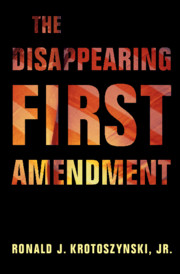Book contents
- The Disappearing First Amendment
- The Disappearing First Amendment
- Copyright page
- Dedication
- Contents
- Preface
- Acknowledgments
- Table of Cases
- 1 Two Steps Forward, One Step Back
- 2 The Public Forum Doctrine and Reduced Access to Government Property for Speech Activity
- 3 The First Amendment As a Source of Positive Rights
- 4 Whistleblowing Speech and Democratic Accountability
- 5 Shedding Their Constitutional Rights at the Schoolhouse Gate
- 6 Transborder Speech
- 7 Systemic Failures to Protect Newsgathering Activities by Professional Journalists and Amateur Citizen-Journalists Alike
- 8 The Citizen As Government Sock Puppet and the State Masquerading As a Citizen
- 9 Using Constitutionally Permissible Statutes to Impede First Amendment Activity
- 10 Conclusion
- Notes
- Index
5 - Shedding Their Constitutional Rights at the Schoolhouse Gate
The Decline of Freedom of Speech for Students and Teachers in the Nation’s Public Schools, Colleges, and Universities
Published online by Cambridge University Press: 02 August 2019
- The Disappearing First Amendment
- The Disappearing First Amendment
- Copyright page
- Dedication
- Contents
- Preface
- Acknowledgments
- Table of Cases
- 1 Two Steps Forward, One Step Back
- 2 The Public Forum Doctrine and Reduced Access to Government Property for Speech Activity
- 3 The First Amendment As a Source of Positive Rights
- 4 Whistleblowing Speech and Democratic Accountability
- 5 Shedding Their Constitutional Rights at the Schoolhouse Gate
- 6 Transborder Speech
- 7 Systemic Failures to Protect Newsgathering Activities by Professional Journalists and Amateur Citizen-Journalists Alike
- 8 The Citizen As Government Sock Puppet and the State Masquerading As a Citizen
- 9 Using Constitutionally Permissible Statutes to Impede First Amendment Activity
- 10 Conclusion
- Notes
- Index
Summary
Under existing Supreme Court precedents, and as Professor Peter Byrne observes, “[t]he First Amendment protects academic freedom.”1 The argument in favor of recognizing academic freedom in the context of a government-sponsored college or university is relatively easy to make.2 The case for academic freedom in K-12 public schools is considerably more complicated because government historically has exercised very broad authority over the curriculum in the public schools (notably including specific learning requirements for promotion and graduation). Moreover, the notion that public school teachers and students can exercise substantial autonomy as speakers in the context of curricular activities exists in substantial tension with the traditional powers of the state governments to regulate comprehensively the public schools.3
The Warren Court first recognized academic freedom in the college and university context – and then extended this protection to the public school context. Although it did not expand on these precedents, the Burger Court did not resile from them.4 The Rehnquist and Roberts Courts, however, have significantly reduced the scope of First Amendment protection available to faculty and students alike in the nation’s public schools, colleges, and universities.
- Type
- Chapter
- Information
- The Disappearing First Amendment , pp. 95 - 120Publisher: Cambridge University PressPrint publication year: 2019



